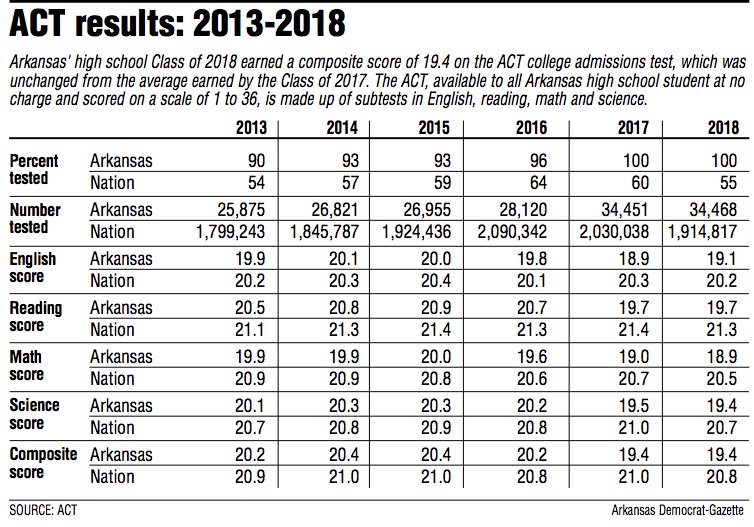Arkansas' high school Class of 2018 earned an average score of 19.4 on the ACT college entrance exam, unchanged from the composite score earned by the previous class.
As in the past, the state's composite score in 2018 trailed the nation's composite score. The national score dropped to 20.8 from 21 in 2017, triggering alarm among test-makers about the lackluster math performance in the nation's most recent graduating class.
The ACT exam is scored on a scale of 1 to 36 and is made up of subtests in English, reading, math and science. Arkansas' 2018 class scored an average of 19.1 on the English subject-area test, up from 18.9 in 2017. But the class dipped in math, earning an 18.9 compared with 19 for the 2017 class. The average reading score stayed at 19.7 for the 2018 class, and the science average dropped to 19.4 from 19.5.
The subject-area scores are used to determine whether new Arkansas college students must take non-credit remedial courses in a subject. Students must earn scores of 19 or better to avoid the remedial college courses in the corresponding subjects, such as college algebra. ACT scores are also a factor in determining high school graduates' eligibility for college scholarships.
In Arkansas, all public high school students have the opportunity to take the college entrance exam at least once at no charge, typically when they are juniors, or 11th-graders. Arkansas is among 18 states -- including Missouri, Nebraska and North Carolina -- to provide universal free access to the test.
"This is the second year that results from the statewide administration of the ACT in the 11th grade are reflected in the graduating class report," Arkansas Education Commissioner Johnny Key said.

"Based on these results, we will continue to work with districts and communities to improve the delivery of education in Arkansas. With ongoing implementation of statewide programs such as R.I.S.E. Arkansas and the computer science initiative, we are confident that student performance on the ACT will increase across the state."
R.I.S.E. is the Reading Initiative for Student Excellence -- an effort to increase the number of third-through-eighth-graders who read at the "ready" or better levels on the state-required ACT Aspire tests. The goal is to increase the number by 10 percent within three years. A related goal is to increase the number of graduates meeting the reading-readiness benchmark on the ACT college entrance exam by 10 percent within five years.
Components of the initiative include a statewide campaign to promote reading in Arkansas communities and efforts to improve reading instruction by helping teachers understand how children learn to read.
A total of 34,468 students in the Class of 2018 took the ACT college admissions test, just slightly more than the 34,451 Arkansas test-takers in the 2017 class. That was the first class in which all students had access at least once to free tests. The number of test-takers in the 2017 class jumped by 6,331 compared with the number of test-takers in the Class of 2016.
Sarah McKenzie, the executive director of the University of Arkansas, Fayetteville's Office for Education Policy, said the state's efforts to give every student at least one free test is a practice to be supported and that students really need to be encouraged by their schools to take the test more than once to achieve higher scores. Test-fee waivers are available for repeat testing, particularly for students from low-income families.

In Arkansas, 21,134 of the 2018 high school graduates took the test two or more times and had an average composite score of 21.2, compared with an average 16.5 for the 13,334 students who took the test only once, according to the ACT Inc. analysis of the state's data.
Increasing student skills in math and reading long before the 11th-grade test administration is ultimately the best way to raise scores, McKenzie said.
"It's a classic example of weighing the pig doesn't make it heavier," she said. "Just testing the kids isn't going to make them know more. These are helpful, once-a-year snapshot-indicators ... of how our students are doing compared to prior years or to kids across the country. The real work is what happens in the classroom every day and how teachers are assessing where their kids are and teaching them the skills they need to learn."
Like McKenzie, Maria Markham, director of the Arkansas Department of Higher Education, applauded the universal administration of the test.

"Just by taking the exam, many students are more aware of their options for education beyond high school," Markham said, adding that the options are numerous.
"Arkansas higher education offers many different degrees, certificates, and workplace skills that will only help to prepare the next generation for the labor market."
Across the nation, about 1.9 million students -- 55 percent of 2018 high school graduates -- took the ACT, earning a composite of 20.8, down from 21. The English, math, reading and science subject-area test results all dipped, with the math average falling to 20.5 from 20.7 and science falling to 20.7 from 21.
"The negative trend in math readiness is a red flag for our country, given the growing importance of math and science skills in the increasingly tech-driven U.S. and global job market," ACT Chief Executive Officer Marten Roorda said in a statement.
"It is vital that we turn this trend around for the next generation and make sure students are learning the math skills they need for success in college and career," Roorda said.
ACT Inc., based in Iowa City, Iowa, reports not only the average scores but also the results in terms of percentages of ACT test-takers who meet "college readiness benchmark scores" in the subject areas. Those scores are identified as the minimum ACT subject scores needed to give students a 50 percent or better chance of earning a B or a 75 percent chance of earning a C or better in corresponding freshman college courses.
Nationally, 27 percent of test-takers met college-readiness standards in all four tested subjects.
Seventeen percent of test-takers in Arkansas' 2018 class met all four ACT benchmarks, which was up from 16 percent in 2017.
Broken down by subject, 53 percent of the Natural State test-takers met the English benchmark score of 18 on the 1-to-36 scale. Thirty-six percent of Arkansas test-takers met the reading benchmark score of 22 on the test.
About 1 in 4 -- 27 percent -- met the math benchmark score of 22, and 26 percent met the benchmark score of 23 in science. The minimum ACT benchmark score for college success in the STEM fields of science, technology, engineering and math is 26. Eleven percent of the Arkansas test-takers and 20 percent of test-takers nationally met that mark.
Arkansas' highest average composite score in recent years was 20.6 in 2006, 2008 and 2009.
In Pulaski County, the Little Rock School District's composite score for the 1,344-member Class of 2018 was 18.3, down from 18.6 for the 2017 class. But it was better than the 18.2 composite score in 2016.
The subject-area scores in Little Rock for the 2018 class ranged from 17.8 in English to 18.6 in reading. The math score was 18.1.
The Pulaski County Special and Jacksonville/North Pulaski school districts bucked the state and national trends with increases in composite and subject-area tests.
The Pulaski County Special district's composite score for the 896-student 2018 class was 18.6, up from 18.3 in the 2017 class. The English test score rose from 17.5 to 18.2 in the Pulaski Special district. Math improved from 17.8 to 18.
The Jacksonville/North Pulaski district's composite score was 17.1, up from 16.9 a year ago, Superintendent Bryan Duffie said, adding that all of the subtests also improved slightly for the district.
"We still have a lot of work to do. It's a small improvement, but that's where we are. No regression," Duffie said. "We'll take it."
A Section on 10/17/2018
